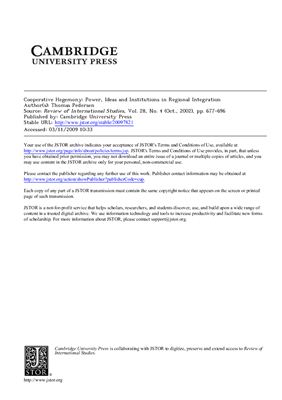Статья в журнале Review of Inteational Studies (2002), 28, стр.
677-696 Copyright. British Inteational Studies Association
For realists regionalism remains a difficult phenomenon to explicate. A particular puzzle for realists is why major states should want to pursue regional institutionalization. Nor are pluralist accounts satisfactory given the empirical evidence of state actor prominence in processes of regional institutionalization. This article sets out to account for the formative phase of regionalist endeavors, proposing an ideational-institutional realism as the basis for understanding regionalism. On this basis a specific theory of co-operative hegemony is developed. Stressing the importance of the grand strategies of major regional powers and their responses to the balance-of-threat in a region, the author argues that major states may advance their interests through non-coercive means by applying a strategy of co-operative hegemony which implies an active role in regional institutionalization and the use of, for instance, side payments, power-sharing and differentiation. The article outlines a number of preconditions for regional institutionalization, stressing what is called the capacity for power sharing; the power aggregation capacity and the commitment capacity of the biggest power in a region. While regionalizing state elites are constrained, they possess a much greater freedom of choice than neo-realism claims.
For realists regionalism remains a difficult phenomenon to explicate. A particular puzzle for realists is why major states should want to pursue regional institutionalization. Nor are pluralist accounts satisfactory given the empirical evidence of state actor prominence in processes of regional institutionalization. This article sets out to account for the formative phase of regionalist endeavors, proposing an ideational-institutional realism as the basis for understanding regionalism. On this basis a specific theory of co-operative hegemony is developed. Stressing the importance of the grand strategies of major regional powers and their responses to the balance-of-threat in a region, the author argues that major states may advance their interests through non-coercive means by applying a strategy of co-operative hegemony which implies an active role in regional institutionalization and the use of, for instance, side payments, power-sharing and differentiation. The article outlines a number of preconditions for regional institutionalization, stressing what is called the capacity for power sharing; the power aggregation capacity and the commitment capacity of the biggest power in a region. While regionalizing state elites are constrained, they possess a much greater freedom of choice than neo-realism claims.

